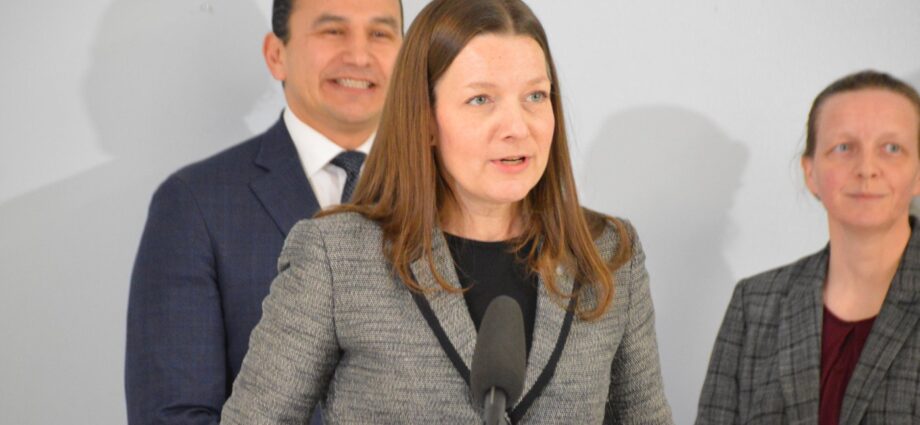
By Dave Baxter, Local Journalism Initiative Reporter, Winnipeg Sun
February 18, 2024
Manitoba’s environment minister explained Friday why the province killed a proposed silica sand mine project just days after announcing with much fanfare that another silica sand mine has been given the government’s blessing.
“The two projects could not be more different,” Environment and Climate Change Minister Tracy Schmidt said Friday.
“Really the only similarity between the two projects is the resource being mined which is silica sand.”
On Wednesday, Schmidt and Premier Wab Kinew were in the city of Selkirk where they announced that the province has given final approvals for both a solar glass production plant in Selkirk, and a silica sand mining facility on the Hollow Water First Nation.
Calgary-based Canadian Premium Sands Inc. will now build the two facilities that will work in unison, as sand extracted from the mine on the First Nation will be used for production at the solar glass factory in Selkirk.
But just two days after that announcement both Schmidt and Kinew were in the RM of Springfield where they announced that the proposed silica sand mine that Alberta-based Sio Silica wants to build in Springfield will not receive an environmental license.
Schmidt said the different decisions came down to the fact that the methods that will be used at the Hollow Water facility have been proven to be no threat to the environment or aquifers, while the methods that would be used at the one in Springfield have not.
“The project we approved earlier in the week is using more traditional mining methods and there is no requirement to dig through aquifers, and there is no possible impact to aquifers, while the project here in Springfield was a way of mining that has never been done anywhere in the world,” she said.
“Drilling through aquifers is simply too risky at this stage.”
Springfield councillor Andy Kuczynski, who has opposed the mine project in his community for months, said Friday his opposition was never towards the company, but always about the way they wanted to extract sand.
“I’m not against Sio Silica, and I’m definitely not against progress and economic opportunities, it was always about how they wanted to do it,” Kuczynski said.
“It’s unproven and there are too many risks. We can’t put our drinking water at risk.”
Kinew said on Friday that the province’s decision regarding Sio Silica’s plans should not lead Manitobans to believe that they aren’t supportive of economic development through mining.
“Our province is one that is rich in critical minerals, and as your government we will build capacity for more processing and opportunities to build up that supply chain,” Kinew said.
“I want to be clear, we are prepared to develop mining opportunities here in Manitoba, but it has to be done in the right way.”
Subscribe to our newsletter.
— Dave Baxter is a Local Journalism Initiative reporter who works out of the Winnipeg Sun. The Local Journalism Initiative is funded by the Government of Canada.


